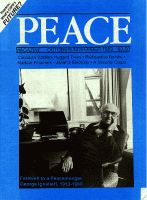
Peace Magazine Oct-Nov 1989, page 6. Some rights reserved.
Search for other articles by Jean Smith here
ON REMEMBRANCE DAY it is appropriate to commemorate the victims of past wars. We should give some second thoughts, however, to the prevailing view that their sacrifice was made to ensure our freedom and security in a peaceful world. Could the high costs in lives have been avoided in stopping Hitler and the Japanese?
WE ARE LED by conventional wisdom to believe that World War II broke out because Britain, France, and their allies lacked sufficient military preparedness.
But why had these nations failed to block Hitler's arms buildup and territorial expansion? Hitler was weak in the early '30s and could have been stopped if other European countries had supported the democratically elected German and Spanish governments and upheld their pact to defend Czechoslovakia. The League of Nations could have stopped Mussolini's invasion of Ethiopia. Why did the American government disallow the sale, for cash, of planes to the Spanish Republicans but permit the sale, on credit, of oil to Franco? Why did Canada continue to sell scrap iron to Japan when it was obvious they were increasing their military arsenal already being used in China? Why did Canada turn away a boatload of Jews fleeing persecution in Germany?
On the false ground of protecting Canadian neutrality, the Canadian government of W.L.M. King passed legislation attempting to prevent Canadians from volunteering to fight for the Spanish Republic in that nation's Civil War. His intention was to placate reactionary Catholic opinion in Quebec, and it was for that same reason also that his government's policies against Jewish immigration were so harsh. King also legislated against Canada's exporting goods to Spain. Similar legislation was not applied to Japan, then brutally invading China, since powerful mining interests, such as International Nickel, were making major sales to Japan to assist its war industries. Anti-Semitic immigration policies were justified on the grounds that there were known Communists among Jewish refugees.
Few Canadians who were involved in the terrible experiences of World War II fully understand the extent of their country's pre-war economic collaboration with fascism. Even fewer are aware that such trading with the enemy continued during the most intense period of World War II's battles. General Motors, Dupont, IT&T, Standard Oil, and Ford all produced military supplies for the Nazi armed forces even after the American declaration of war against Germany.
WE ARE STILL selling arms to repressive regimes, ignoring the clear lessons of the Second World War. On Remembrance Day, we should dedicate ourselves to preventing similar collaboration with oppression and pay attention to the offensive aspects of our nation's foreign policy, such as selling arms to Indonesia, which is involved in a genocidal war against East Timor.
Jean Smith manages PEACE's office.

Peace Magazine Oct-Nov 1989, page 6. Some rights reserved.
Search for other articles by Jean Smith here